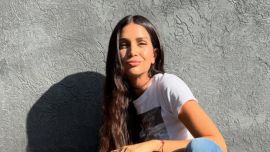The United Nations (UN) and the European Union (EU) joined with the government this week to launch the Spotlight Initiative in Argentina, a multi-year, multi-nation bid to eliminate violence against women and girls.
The launch, which took place yesterday at the Centro Cultural Kirchner before a packed audience, counted on participation from some top politicians and activists, while the organisers emphasised the need for multilateralism and paid tribute to the strength of Argentine civil society.
Spotlight’s presence in Argentina is part of a wider commitment towards the UN’s 2030 Sustainable Development goal of gender equality and women’s empowerment. With the EU as the primary donor, the initiative is investing an initial 260 million euros across 13 countries, with 50 million euros alone committed to Latin America. Of the five selected Latin American countries to benefit, the focus is on femicides – according to the scheme’s website, the region includes 14 of the 25 countries with the highest femicide rates globally. Citing official data from 2017, Spotlight highlighted throughout the launch that Argentina suffers one femicide every 32 hours.
The initiative will be implemented as from April in two stages: the first is an initial investment of USD$6 million, running until December, 2020, with the second stage running until December 2022. Total investment is expected to be around US$9 million in total. The scheme focuses several pillars such as prevention, education, services for survivors, enforcing current laws and bolstering policy.
“I want to thank the EU and the UN for bringing the initiative to the country, acknowledging our progress in ending the violence [against women and girls],” said President Mauricio Macri in a short speech on Thursday.
“It’s not just about women getting out of dangerous situa9 ARGENTINA VIOLENCE AGAINST WOMEN tions, it’s about eliminating violence forever and for that, we have to work on educating our children,” declared Macri. “We all need to give an example because this is a crosssectional issue and we can’t look the other way anymore.”
PROVINCIAL FOCUS
The provinces of Salta, Jujuy and Buenos Aires will be the focus of Spotlight here in Argentina. Those regions suffer the highest national femicide rates: the first two in relation to their population size and the latter in terms of absolute numbers.
At a press conference on Tuesday, organisers stated that 50 percent of the initial investment will be distributed equally between the three provinces, with 50 percent committed to “national reinforcement measures” destined towards the three branches of government and the INAM’s National Plan Against Violence. There will also be a fund destined towards civil society organisations that are fighting to prevent femicides and assist survivors.
Argentina was the only country selected from the Southern Cone: the Spotlight committee attributed this to the country’s current commitment to fighting gendered violence as well as its international cooperation.
“The alliance between the EU, the UN and Argentina is no accident. We all believe that the world can work if it is multilateral, if we support each other based on rules and not who is the strongest. That’s why the EU decided to work with the UN for Spotlight and chose a country, Argentina, that strongly supports multilateralism,” said Aude MaioColiche, EU Ambassador to Argentina, at Tuesday’s press conference.
ALLIANCE
At the CCK on Thursday, Buenos Aires Governor María Eugenia Vidal, Vice-Governor of Salta Miguel Ángel Isa and Jujuy Governor Gerardo Morales came onstage to sign an “Alliance Against Femicides” document, officially launching the initiative in their provinces alongside the head of the National Women’s Institute, Fabiana Tuñez.
Tuñez — a key figure in organising the initiative in Argentina — gave a short, passionate statement to the audience: “With this signing, we are showing our commitment from the State, the EU and the UN to shine a light where the problems lie: to find them, take responsibility for them and work towards solving them. We are lifting our arms together with one objective: to work, work, work and do, do, do in every corner of this country because Argentina is massive and this is just the first step. A first step we are truly making together. This is how we work, united, against violence: ni una menos, nunca más!”
Spotlight’s organisers were very clear in saying that they were empowering forces on the ground, not “meddling” with policy or organisations. The focus was very much on current policy efforts and the role of civil society, taking into account the strength of Ni Una Menos in Argentina and the influence of the national feminist movement in the region. According to René Mauricio Valdés, Resident Representative of United Nations Programme for Development (UNDP) in Argentina, “the investment will not go to waste here: it will be planted in fertile soil.”
When representatives of civil society were brought onstage at the ceremony, however, the president and governors had already left after signing the document. This detail was not lost on Mabel Bianco, the leader of the Foundation of Women’s Studies and Investigation (FEIM): “This programme has six pillars, the sixth of which refers to us, civil society, but we are present in all of them. This programme could not live without us and that’s why I think it’s a shame that our national and provincial authorities have already left. I’m sure they are very busy, but this is very important to us.”
AUSPICIOUS LAUNCH
Their absence was not in the initial plan for this auspicious launch ceremony: there were allegedly last-minute changes to the schedule in order for the politicians to participate at the top of the ceremony. However, as one participant told the Times, “when you come to see a concert, you don’t go for the opening act: the real show here is the civil society.” Given that there are already criticisms towards politicians across the board for not addressing gender issues during an electoral year, this could be considered a missed opportunity.
“What started out as a small movement is now a very big one. If our representatives can’t hear that civil society is screaming for this change, then I am sorry, but more fool them. We have laws, but no real policies. We know that civil society can’t achieve this level of change alone, but neither can the government do it alone,” Bianco said.
Spotlight is set to work with civil society organisations in order to reach women that suffer overlapping discriminations (indigenous women, women with disabilities and trans women, for example). However, there is no information regarding what organisations have been chosen and thus no indication as to what groups are set to benefit. At the ceremony, the panelists alongside Dr. Bianco showcased the organisations “Deaf Women Without Violence,” the Avon Foundation and the Juanita Moro Foundation. The audience also heard the emotional testimony of Héctor Marino Suárez, father of femicide victim Natalia Rocha.
Despite remaining questions over the implementation of the programme – including what areas will truly be focused on and what organisations will receive the international investment – the Spotlight programmes will be officially launched nationwide and in the three beneficiary provinces later this year. Given the context of femicides, lack of enforcement and budget issues during what is set to be a tumultuous electoral year, any aid is welcome.























Comments